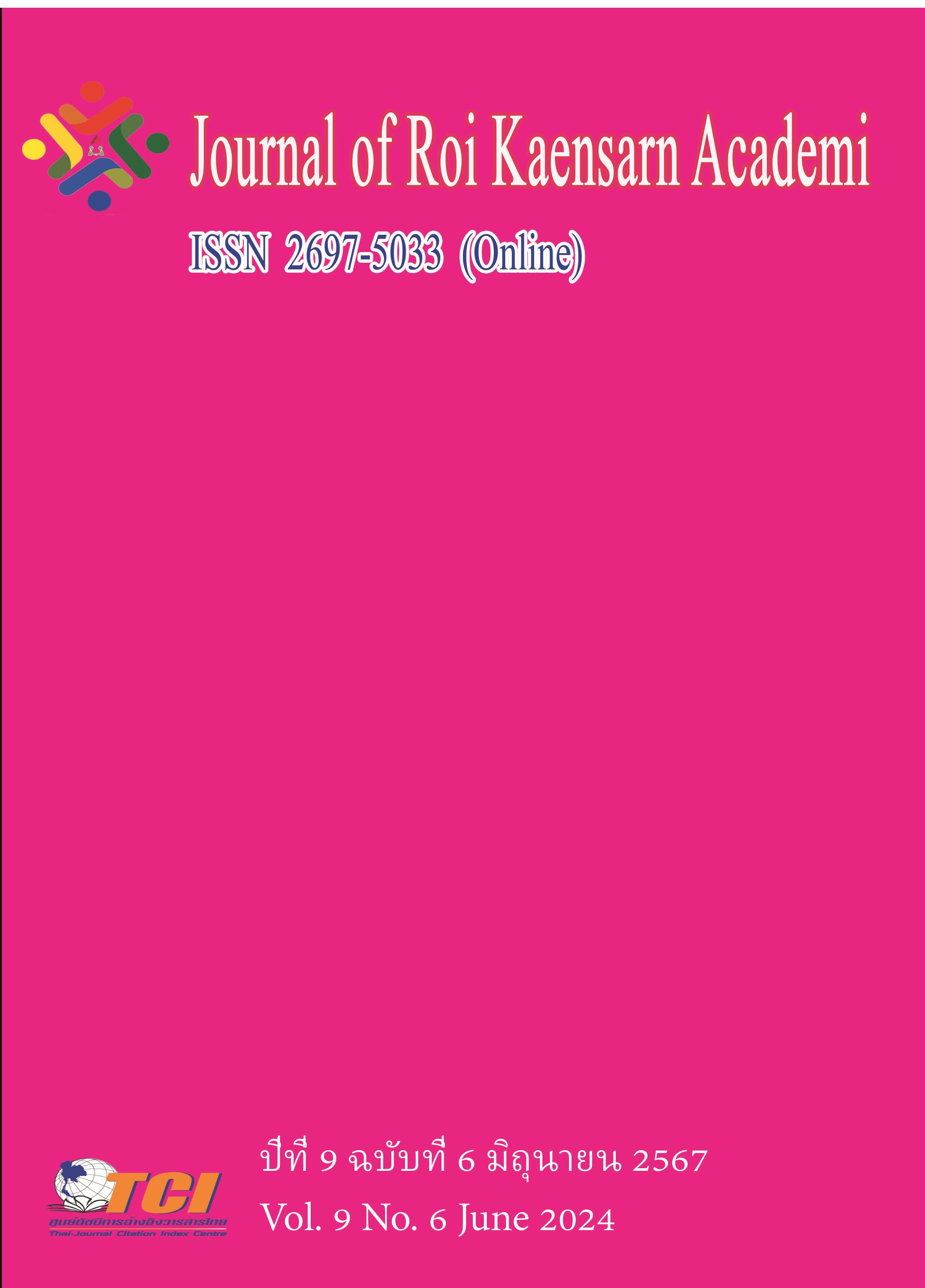The Moderation Effect of Supervisor’s Power Distance and Mediation Effect of Interpersonal Relationship on The Relationship Between Supervisor’s Trust and Empowering Leadership in Higher Vocational Colleges in Henan Province
Main Article Content
บทคัดย่อ
The objectives of this research were: (1) to develop a relationship model of factors on empowering leadership of public higher vocational colleges in Henan Province. (2) To find mediating factors in the model of empowering leadership in Henan provincial higher public vocational colleges (3) to find moderation effect of the supervisor’s power distance on the relationship between the supervisor’s trusts and empowering leadership. The research design was a quantitative survey research, Population in this study were 3,329 senior officials from 25 public vocational colleges in Henan Province. A multi-stage random sampling technique was adopted to selected 400 senior officials as the sample. Basic statistics were employed for demographic data analysis, the CFA was used for measurement model, the SEM were employed for structural model analysis, and z-test was used to test the hypotheses.
The research results showed that: (1) the relationship model was composed of 3 latent variables namely supervisor’s trust, interpersonal relationship, and empowering leadership, and the model fit well with the empirical data. (2) The supervisor’s trust and interpersonal relationship play a mediating role in the model. (3) Power distance plays a moderating effect the relationship between the supervisor’s trust and empowering leadership.
Article Details
เอกสารอ้างอิง
Ahluwalia, L. (2020). Empowerment leadership and performance: Antecedents. TECHNOBIZ: International Journal of Business. 3 (2), 35-39.
Anderson, D. (1992). Supervisors and thehesitate to delegate'syndrome. Supervision. 53 (11), 9-11.
Arnold, J. A., Arad, S., Rhoades, J. A., & Drasgow, F. (2000). The empowering leadership questionnaire: The construction and validation of a new scale for measuring leader behaviors. Journal of Organizational Behavior. 21 (3), 249–269. https://doi.org/https: //doi.org/ 10.1002/1099-1379
B, Y., N, D., & T, L. (2011). Measuring Hofstede’s five dimensions of cultural values at the individual level: Development and validation of CVSCALE. Journal of International Consumer Marketing. 23 (3-4), 193-210.
Byun, G., Lee, S., Karau, S. J., & Dai, Y. (2020). The trickle-down effect of empowering leadership: A boundary condition of performance pressure. Leadership and Organization Development Journal. 41 (3), 399-414.
Eylon, D. A. (1999). Exploring empowerment cross-cultural differences along the power distance dimension. International Journal of Intercultural Relations. 23 (3), 373-385. https://doi.org/http://dx.doi.org/10.1016/S0147-1767(99)00002-4
Gaskin, J., & Lim, J. (2018). Indirect effects. AMOS plugin. Gaskination's StatWiki.
Hui, W., & Cuilian, Z. (2012). A review of research on leadership behavior in Chinese enterprises: Executive leadership behavior,leadership empowerment,and leader-subordinate exchange. Advances in Psychological Science. 10, 1519-1530.
Hur, M. H. (2006). Empowerment in terms of theoretical perspectives: Exploring a typology of the process and components across disciplines. Journal of Community Psychology. 34 (5), 523-540. https://doi.org/http://dx.doi.org/10.1002/jcop.20113
Jun, T., Kai, W., & Mengqin, L. (2018). The antecedents and effectiveness of leadership empowerment behavior. Financeand Accounting Communication. 14, 65-68. https://doi.org/http://dx.doi.org/10.16144/j.cnki.issn1002-8072 .2018 .14 .016
Li, L., Zheng, X., Sun, S., & Diaz, I. (2020). Does subordinate moqi affect leadership empowerment? Leadership & Organization Development Journal. 41 (8), 1015-1034. https://doi.org/10.1108/LODJ-08-2019-0351
Lian, K. F. (2017). Trust, leader-member exchange and organizational outcomes: a structural equation model in the Malaysian work setting. The Journal of International Social Research. 10 (52), 1097-1108.
Lin, M., Ling, Q., Luo, Z., & Wu, X. (2019). Why does empowering leadership occur and matter? A multilevel study of Chinese hotels. Tourism Management Perspectives. 32. https://doi.org/http://dx.doi.org/100556.10.1016/j.tmp.2019.100556
Ng, K. Y., & Chua, R. Y. (2006). Do I contribute more when I trust more? Differential effects of cognition-and affect-based trust. Management and Organization review. 2 (1), 43-66. https://doi.org/10.1111/j.1740-8784.2006.00028.x
Pengbo, L., Yuqing, S., & Ming, L. (2019). How is Power Granted: The Formation Mechanism of Leadership Authorization Behavior from the Perspective of Goal Theory. Advances in Psychological Science. 7, 1167-1182.
Qing, X. (2022). Problems and Solutions in Human Resource Management of Public Institutions under the Background of Reform. Talent Resources Development. 13, 37-38. https://doi.org/http://dx.doi.org/10.19424/j.cnki41-1372/d202213023
Richardson, H. A., mason, A. C., Buchholtz, A. K., & Gerard, J. G. (2002). CEO willingness to delegate to the top management team: The influence of organizational performance. The International Journal of Organizational Analysis. 10 (2), 134-155. https://doi.org/ http://dx.doi.org/10.1108/eb028947
Shin, J., & Lee, S. (2023). Leaders' empowering behaviors: An investigation of antecedents. Social Behavior and Personality: an international journal. 51 (3), 57-67. https://doi. org/10.2224/sbp.12192
Tang, G., Chen, Y., van Knippenberg, D., & Yu, B. (2020). Antecedents and consequences of empowering leadership: Leader power distance, leader perception of team capability, and team innovation. Journal of Organizational Behavior. 41 (6), 551-566. https://doi.org/10.1002/job.2449
van Knippenberg, D., Giessner, S. R., Sleebos, E., & van Ginkel, W. P. (2021). A motivated information processing perspective on the antecedents of empowering leadership. Journal of Applied Social Psychology. 51 (2), 79-89. https://doi.org/10.1111/jasp. 12718
Wang, S., De Pater, I. E., Yi, M., Zhang, Y., & Yang, T. P. (2020). Empowering leadership: employee-related antecedents and consequences. Asia Pacific Journal of Management. 1-25. https://doi.org/10.1007/s10490-020-09734-w
Wenjie, Z., Jiwen, S., & Haolan, L. (2015). The Connotation, Structure and Measurement of Followership Power in the Chinese Context. Journal of Management Science. 3, 355-363.
Yu, B., Liu, B., & Cai, D. (2017). Antecedents and Consequences of Empowering Leadership. In Academy of Management Proceedings. 2017 (1), 13392.
ZHAN, X. (2023). The impact of subordinates’ proactive personality on empowering leadership.

